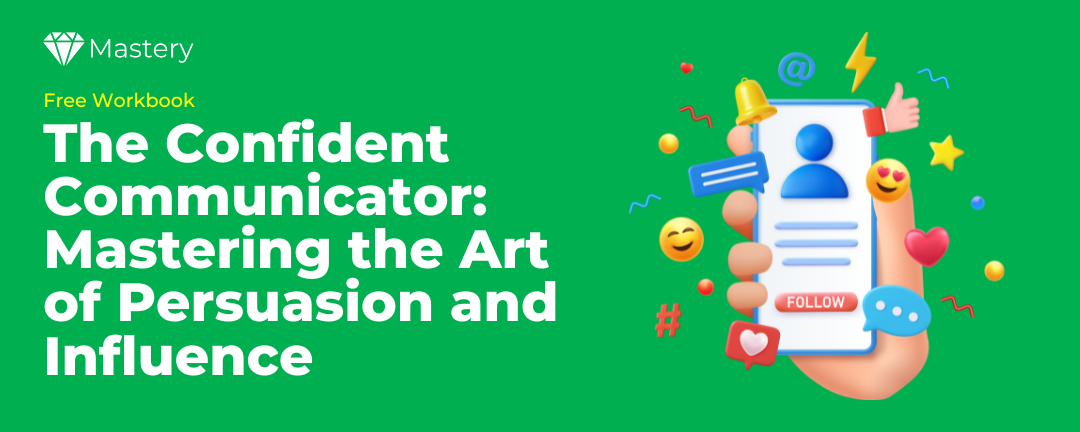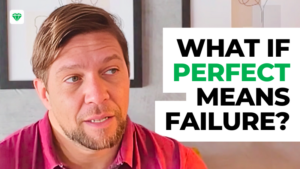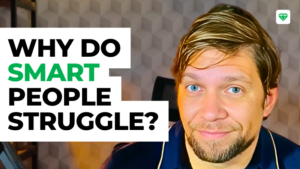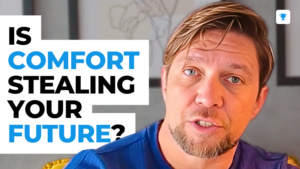
.
.
✅ FREE WORKBOOK: The Confident Communicator: Master the Art of Persuasion and Influence
Listen to the podcast version
Breaking a promise is one of the biggest mistakes you can make.
For social beings that rely on each other to survive, like us, a broken promise creates a conflict between what we expect and what actually happens.
Our brains are set up to trust and build connections, leaving us vulnerable when those connections are broken.
In the book The 7 Habits of Highly Effective People, Stephen Covey introduces the concept of the Emotional Bank Account by saying this:
“An Emotional Bank Account is a metaphor that describes the amount of trust that’s been built up in a relationship. It’s the feeling of safeness you have with another human being.”
Think of your relationships like an emotional bank account. Just like regular bank accounts, your interactions with others involve deposits and withdrawals.
When we do something kind, honest, or helpful, we make a deposit into the Emotional Bank Account of that relationship, and these deposits build up a reserve of goodwill and trust.
In this scenario, people of integrity are rich.
This is important because, as humans, we are bound to make mistakes. No one is perfect, but with a rich Emotional Bank Account, mistakes will not define you.
Instead, they will be just small blips in a larger pattern of positive behavior. It’s like having a $1k problem with a $1M-dollar reserve.
So, how can we build that reserve?
The answer is personal integrity.
Let’s explore the 6 steps to build the Emotional Bank Account of integrity.
Understanding the Individual
The first step to building a rich Emotional Bank Account is understanding the individual.
Stephen Covey talks about the importance of listening to others with the intent to understand, not reply.
When we listen with the intent to reply, we impose our script into other people’s lives. Whatever matters to us is embedded in that response.
That’s an unconscious attempt to be understood. We’re using the other person’s exposure of the situation to explore our own insecurities in that subject, turning the conversation about us, while we cover ourselves with a mantle of empathy.
The first thing you need to do to be able to listen with the intent to understand, instead of reply, is to ask questions.
Questions will keep the exploration in the field of the other person’s interest and perspective. It will help them exercise their thoughts about the matter, explore their vulnerability, and update their script.
Also, listening with the intent to understand requires a shift in perspective. What matters is not your value structure, but the other person’s.
That’s what empathy looks like. You’re not helping or adding value to their perspective because you think you know the answers.
Your answers mean something in your value structure, not theirs.
Listen with the intent to understand, instead of reply makes huge deposits in the emotional bank account of any relationship.
Attending to the Little Things
The second step to building a rich Emotional Bank Account is attending to the little things.
In relationships, the little things are the big things.
Stephen Covey talks about the power of small acts of kindness and courtesy. These small gestures may seem insignificant, but they add up over time, creating a strong foundation of trust and goodwill.
The fastest way to attend to the little things and connect with someone is by trying to be interested instead of interesting.
So, here is a crash course on how to be interested:
- Ask more than you answer.
- Listen more than you speak.
- Keep eye contact.
- Make specific compliments.
- And smile.
The bottom line is that these small things require attention to your vocabulary, body language, gestures, and facial expressions.
If you start seeking opportunities to say “thank you” and “please”, holding doors, and smile, they will start showing up and you will start to see how much you were missing.
Keeping Commitments
The third step to building a rich Emotional Bank Account is keeping commitments.
Stephen Covey points out that breaking a promise is one of the quickest ways to lose trust.
So, what do you do to keep commitments?
Start with being realistic about what you can promise. You don’t build trust by making promises, but by fulfilling them.
It’s better to promise a little and keep your word than to overcommit and fall short.
People won’t be able to hear what you say if your actions are speaking louder in the opposite direction of your words.
That happens because we don’t see the world. What we see is just a map made of our past experiences, our personalities, and the limitations of our perception.
When what actually happens around us doesn’t reflect what is plotted on our maps we feel lost. Anxiety kicks in because we’re not where we thought we were.
What’s the immediate course of action? Getting out of there. If “there” is a person.
Not trusting that person anymore is “getting out of there”.
Keeping commitments is giving others the realization of their expectations about you.
That’s a huge deposit in the emotional bank account of any relationship.
Clarifying Expectations
The fourth step to building a rich Emotional Bank Account is clarifying expectations.
And the most effective way to clarify expectations is by setting clear expectations, so you don’t have to clarify them when a problem emerges.
One of the worst-case scenarios is when you spend time and energy on fulfilling a promise that has nothing to do with what the other person expects.
When you promise something, be specific about what you will deliver and when.
When is actually a big deal because Christmas presents have little value when delivered in January.
It’s always a good idea to not assume anything. Ask questions and listen to others’ expectations. Make sure you understand their needs and exactly what they expect from you.
Regular check-ins are another way to clarify expectations. Why? Because situations can evolve and expectations shift with this evolution.
Touch base with the people involved to make sure that everyone is still on the same page.
Showing Personal Integrity
The fifth step to building a rich Emotional Bank Account is showing personal integrity.
But what is integrity?
Consider these 3 elements as fundamental parts of the image you project in the world:
- What you say
- What you do
- What you believe
Now, imagine that these elements that project your image and give the world means to have an opinion about how you live in different spaces.
What you say lives in one place, what you do lives in another, and what you believe lives apart from both.
Integrity is the opposite situation. It’s when what you say, do, and believe live in the same realm of possibilities.
What’s possible for one is also possible for the other 2.
To be an integral person, you do what you say because you believe in that.
The harder it is to keep those elements together, the more powerful the integrity of your character becomes by doing that.
When people see that you act with integrity, they know they can count on you to do the right thing no matter what.
The Laws of Love and the Laws of Life
The sixth and last step to building a rich Emotional Bank Account is understanding and respecting the laws of love and the laws of life.
Stephen Covey tells us that when we make deposits of unconditional love, we encourage others to live by the principles of cooperation, contribution, self-discipline, and integrity.
When you attach conditions to your love, you push others into a defensive position where they feel they must prove their worth.
That’s a relationship based on utility. That’s the opposite of a relationship based on affection.
What’s the problem with that?
Let’s say someone is looking for a relationship based on affection, if what you offer is utility, meaning, you want to extract something from them to your own benefit, they won’t have affection from you, so they will move away.
Now ask yourself: What’s left?
The answer is: Other people like you who want to have relationships based on what you can offer.
If you break the laws of love, you will end up being surrounded by people who don’t care about you more than what you can offer to improve their lives, and that breaks the laws of life.
In “The 7 Habits of Highly Effective People,” Stephen Covey gives us a powerful framework for building trust and fostering meaningful relationships.
Each small action, each promise kept, and each moment of understanding contributes to a rich Emotional Bank Account that can survive life’s challenges.
Be the person who listens, who cares, who keeps their word, and who loves without conditions.
By doing so, you not only transform your own life but also inspire those around you to do the same.
Keep making those deposits, build your Emotional Bank Account, and Watch how it changes everything.




